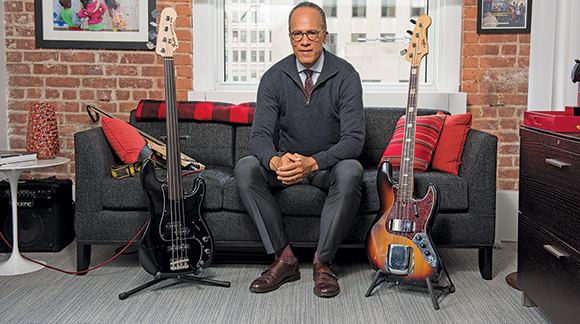Rock Steady
Whether anchoring the nightly news from NBC’s Rockefeller Center studios or laying down the foundation playing bass onstage, Lester Holt enjoys providing a solid, trustworthy presence.
By Joe Bosso | Photos: Ryaon Richards
For most people, the question “What’s more unnerving—interviewing a world leader or jamming with Earth, Wind & Fire?” is a purely hypothetical one. Lester Holt, however, isn’t most people. As a longtime broadcast journalist for the past 35 years and current weeknight host of NBC Nightly News, he’s squared off with presidents and prime ministers from across the globe. But Holt is also a skilled bass player, and in 2008, while doing a segment on the iconic R&B band for Weekend Today, he got a rare opportunity to jam with his idols during a sound check.
“Let’s face it. No matter how many times you’ve done it, any time you sit down to talk to a world leader is a little unnerving,” he says. “But there’s definitely an intimidation factor to playing with Earth, Wind & Fire, too. I mean, come on, they’re the greatest R&B group of all time, if not the greatest group in my lifetime. Verdine White? The guy’s amazing. The whole time I was onstage with them, I was thinking, I can’t believe I’m getting away with this.”
Holt’s reputation as a steady, reliable and trustworthy presence behind the anchor desk has kept NBC Nightly News the most-watched evening newscast since he assumed the post in 2015, attracting seven to eight million viewers on an average weeknight. Interestingly, he cites those same attributes as essential to playing the bass, although he notes that both roles sometimes call for him to go off script at a moment’s notice. “There’s definitely a synergy between doing the news and playing bass,” he says. “I play a lot of jazz. I love jazz. A lot of times you’re reading off a chart, but sometimes you’re just using your ear. That’s part of what keeps it interesting, that sense of the unknown.
“The same holds true for doing the news,” he continues. “Sometimes you’re reading a story, and then it’s breaking news and everything kicks into high gear. I don’t want to minimize it by saying you’re winging it, but you have to fill in the blanks and lead people along. You have to have a foundation there, but you also have to be ready for anything and keep it all together.”
Breaking news blasts have been coming fast and furious over the last few months, and for Holt, who has seen scripts change minutes before a news cast and even mid-show, music remains a calming salve for his high-pressure, high-profile gig. “There’s a lot of stress in this job, for me and everybody,” he says. “I absolutely rely on music, and I play it a lot in the office. I have a desk here in the newsroom, and it’s got a little Bluetooth speaker on it. I’ll crank some music and take requests—‘It’s music time, folks!’ I think it lightens the mood in a good way. Maybe they’re just saying that because I’m the boss, but I think everybody enjoys it.”
The YouTube ID of ZuKh5lQrMvA?feature=oembed is invalid.Holt’s first significant musical memory goes back to his childhood. His father, Lester Holt Sr., served in the U.S. Air Force and moved the family around a bit, spending four years in Alaska before finally settling in Sacramento, California. Holt Sr. had a hi-fi system in the house (“It was one of those big console things, like a piece of furniture”), and one of his favorite records was Harry Belafonte At Carnegie Hall. “Day-o!” Holt sings out, his booming voice echoing down the hallway. “Day-ay-ay-o. I remember listening to that and thinking it was great. I didn’t play an instrument yet, but I loved music, especially some of the jazz legends. The music of your youth is so important. It stays with you.”
Sometimes a confluence of occurrences lead to a single epiphany moment. Holt recalls one such instance taking place in junior high as he watched the school’s stage band perform “Black Magic Woman” during an assembly program. Holt had, of course, heard Santana’s version many times on the radio, but this time something felt different. One of the musicians was playing an upright bass. “It sounded so cool to me,” he remembers. “I was like, ‘What is that?’ It made the whole song sound totally new to me. Or maybe I was just listening with new ears. I loved that bottom end, the way it held everything together. I was drawn right in.”
The next occurrence happened shortly after. Holt was already singing in his school’s jazz choir, and one day he heard that the conductor wanted to put together a rhythm section for the ensemble. “That was the moment when it all came together for me,” he says. “I was like, ‘I could play this bass thing.’ It set me in motion.” His family’s finances were tight, but Holt scrapped enough money together from his newspaper route and hustled over to a pawn shop in downtown Sacramento to buy his dream bass, a Fender Precision.
“Well, there was no way I was gonna get that!” he laughs. “Not with the money I had. So I kind of kicked the tires and saw what else was around in my price range.” Holt wound up with a beat-up red hollow body bass—he can’t remember the name of it—that was incapable of staying in tune. He also purchased a couple of Mel Bay books and immediately set off on a course of self instruction. “I had taken a summer guitar course—I didn’t own a guitar, but the school provided one—but I found the idea of forming chords to be really hard. Playing bass came pretty easily to me. I had the feel for it.”
Pretty soon, Holt joined up with a group of kids who had formed their own band and were performing songs like the Carpenters’ “Close to You.” “They did pretty simple stuff,” he notes, “but the thing is, I knew how to fit in with them. I understood how the bass worked with the music.”
He points out with an understandable degree of pride that he never used a pick: “I started out with my thumb, but then I realized that it was much more efficient to use my fingers. Even teaching myself, I didn’t get into bad habits.”
By his mid teens, Holt’s abilities progressed, and he joined his high school jazz band. The group’s repertoire consisted of Count Basie standards, along with newer selections by Chuck Mangione and Maynard Ferguson. He was considered the “number two” bassist in the group, and when the band’s top bass player graduated, Holt was bumped up to the number one slot. Finances continued to keep that coveted P Bass out of reach, but he got the next best thing: an Aria. “It wasn’t a Fender, but it was close enough,” says Holt. “That was my bass all through high school and for years afterward. I still have it, and I’ve never changed the strings on it.”
The YouTube ID of cWhNWop3g_Y?feature=oembed is invalid.

